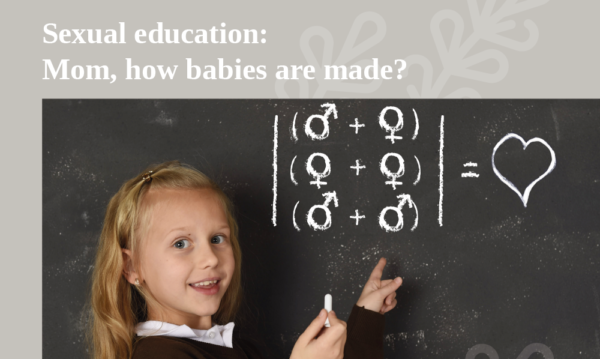When children reach the age of 3-4 years and begin to perceive the differences between the sexes, they can reasonably ask specific questions about the children’s birth and creation. They want to know all the details about creating the human body and especially about issues that parents often avoid talking about. Remember that if children are mature to ask, they are also mature to hear the answer, formulated naturally in a way that differs at every age and is understood by the mental and perceptual level of children.
Many years ago, issues of a sexual nature were taboo, and discussions in the family and social context were considered forbidden. As a result, young people growing up are afraid or even avoid associating with the other sex because of ignorance. In the relationships created, these issues could not be freely discussed, neither the thoughts and feelings of the two partners were expressed openly, which often led to a lack of trust and problems between them.
Today, things have changed very much, and parents talk openly to their children about sex and what it encompasses. Of course, there are many exceptions since many families still avoid addressing these issues and when they appear in the spotlight, ignore them or treat them conservatively.
As parents, you have to explore your perceptions of sexual issues, and then you will be ready to answer a question similarly. So when your child comes and asks you how babies are made, where they come from or how they are created, tell him the truth! Use a vocabulary appropriate for his age to make it as understandable as possible and not create misunderstandings or distortions. Everything depends on the words you use. It’s important to call the genitals by name.
Children are content with the explanation for a younger age: “Dad and Mom love each other very much and embrace tightly and have a child.”
Sexual education does not always have to be done with questions – answers. It can start from a very young age by familiarizing the child with the naked body, implying that nudity is not a shame. Thus, you can bathe together and especially not be ashamed to appear nude in front of the child. By extension, this will help him love his own body and not be ashamed of it. Of course, you have to help him understand in what context this can be done and in which it cannot; to understand, that is, that the parents can see the child naked, the child can see the parents naked, but Mr. D., who stays next to him cannot see the mother naked.
There are no ideal recipes for how to “talk” to your child about these issues. The child must understand that behind the answer he receives, there is not something that the parent reads in a book, but lies the man himself, mom or dad with their ideas and with their perception of life. An excellent way to start is by telling how you met, how you loved each other, and how you felt the need to live forever close to each other.
References:
Oswalt Colle, Ton enfant cet inconnu


